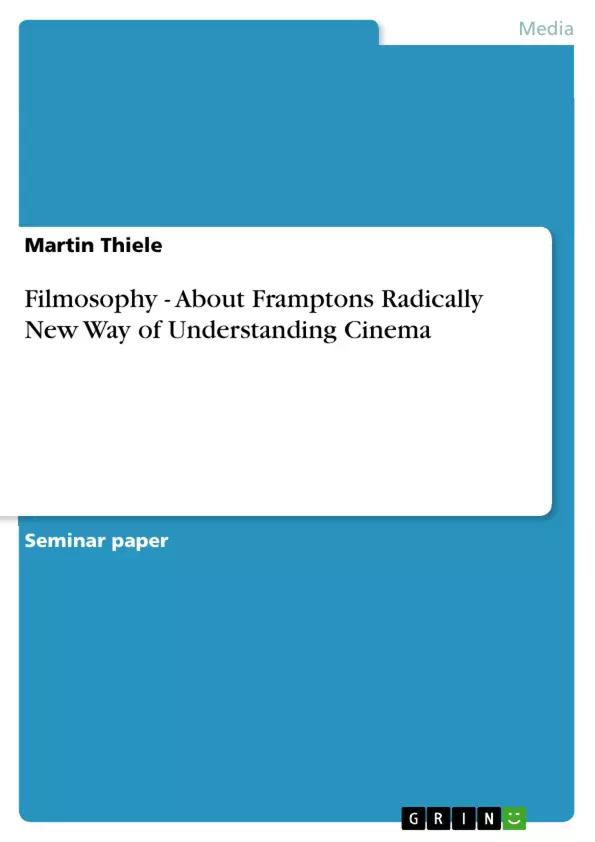Because the times in film production change, a change in reception is also necessary. In Frampton’s theory, film is no longer a photographic reproduction of a past performance. This is not simply be-cause nowadays there are countless assumed realistic film images which were never shot as they are presented later. Frampton concedes that film uses material of the real world but finally – and hence his theory is one of reception – this material becomes its own world with its own processes and even its own thoughts. To draw a consistent picture of his theory he developed a kind of unique language to speak about film.
Inhaltsverzeichnis (Table of Contents)
- INTRODUCTION
- DISCUSSION OF THE TERMS OF FILMOSOPHY
- Film-being
- Filmind
- Film-thinking
- FINAL COMMENT
- IMAGE SEQUENCES
- Sequence one
- Sequence two
- Sequence three
- Sequence four
- BIBLIOGRAPHY
- Literature
- Internet Sources
- Film Sources
Zielsetzung und Themenschwerpunkte (Objectives and Key Themes)
This term paper examines Daniel Frampton's concept of "Filmosophy," a framework for understanding cinema that emphasizes the inherent being of film rather than its representational qualities. The paper aims to analyze Frampton's key terms and apply them to the film "eXistenZ" by David Cronenberg. The paper will focus on the following key themes:- The rejection of traditional film reception theories
- The idea of film as an autonomous "being" rather than a representation
- The importance of filmic experience and immersion
- The development of a unique language to describe and understand film
- The application of Filmosophy to a specific film example, "eXistenZ"
Zusammenfassung der Kapitel (Chapter Summaries)
The introduction presents Frampton's "Filmosophy" as a departure from traditional film theory, which emphasizes the representational nature of cinema. Frampton argues that film is not merely a medium for conveying meaning but rather a dynamic entity with its own inherent processes and qualities. The second chapter explores the key terms of "Filmosophy," focusing on the concept of "film-being." This term refers to the totality of filmic experience, encompassing both the visual and auditory elements and the style of presentation. Frampton argues that these aspects should be considered as a unified whole rather than as separate elements. The third chapter is expected to contain a more in-depth analysis of "eXistenZ" through the lens of "Filmosophy." This will likely involve examining the film's visual and sonic elements, its narrative structure, and the overall experience it creates for the viewer.Schlüsselwörter (Keywords)
The primary focus of this term paper is the development of a new approach to understanding cinema known as "Filmosophy." This concept emphasizes the autonomous nature of film, its inherent "being," and the immersive experience it offers viewers. The paper examines key terms like "film-being," "filmind," and "film-thinking" as proposed by Daniel Frampton. The film "eXistenZ" by David Cronenberg serves as a case study for applying these concepts and analyzing the film's construction and reception.Frequently Asked Questions
What is Daniel Frampton's concept of "Filmosophy"?
Filmosophy is a framework that views film not as a photographic reproduction of reality, but as an autonomous "being" or "mind" with its own inherent thoughts and processes.
What does the term "film-being" mean?
"Film-being" refers to the totality of the filmic experience, where visual, auditory, and stylistic elements are considered a unified whole rather than separate parts.
How does Filmosophy change our understanding of film reception?
It shifts the focus from what a film represents to how the film "thinks" and exists as its own world, requiring a unique language to describe the immersive experience.
Which movie is used to apply the concepts of Filmosophy?
The paper applies Frampton's theories to David Cronenberg's film "eXistenZ" to analyze its construction and reception.
What are the key terms introduced by Frampton?
The key terms discussed are "film-being," "filmind," and "film-thinking," which describe the autonomous nature of cinema.
- Quote paper
- Martin Thiele (Author), 2009, Filmosophy - About Framptons Radically New Way of Understanding Cinema, Munich, GRIN Verlag, https://www.grin.com/document/127134



